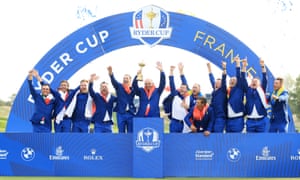Ryder Cup could be a battle between a dozen captain’s picks apiece | Ewan Murray | Sport
Tommy Fleetwood, John Rahm, Rory McIlroy, Victor Perez, Tyrrell Hatton, Danny Willett, Matthew Fitzpatrick, Lee Westwood and Bernd Wiesberger. Brooks Koepka, Dustin Johnson, Patrick Reed, Gary Woodland, Xander Schauffele, Webb Simpson, Justin Thomas and Tiger Woods. If Ryder Cup automatic qualifying was settled today, those 17 individuals would be guaranteed a berth at Whistling Straits.
It hardly represents a B-list of transatlantic golf – the United States, in theory, would be the stronger – but there are notable absentees. Fundamentally, of course, nothing at all should be decided in the context of Ryder Cup selection more than six months in advance of an event due to tee off on 25 September. In these uncertain times, however, we have swiftly become accustomed to pondering imponderables.
Ryder Cup organisers were quick to dismiss a midweek report that cited potential postponement until 2021 of the biennial joust. There are a litany of reasons as to why this would not be favourable, including the knock-on effect on the Solheim Cup and the absence of a Ryder Cup in Europe until 2023.
And yet, it would be a brave individual to rule out upheaval for the Ryder Cup proving necessary, as global sporting events drop from the schedules daily.
The Ryder Cup implemented a switch from odd years to even ones in the immediate aftermath of the 9/11 atrocity in 2001, which took place less than three weeks before Europe were due to play host at the Belfry. As of now, the golf world can only hope that Whistling Straits will stage their show on schedule.
The wildcard picks element grabs the most attention of each respective captaincy. Padraig Harrington has three for Europe. Steve Stricker, who heads up the US side, will make four. These calls to supplement teams can define captaincies and Ryder Cup careers. They have done for decades.
If the European Tour and the PGA of America remain adamant Project 2021 is not on their agenda, it can be guaranteed the compilation of teams for 2020 has been. It would add excitement, pressure and drama should the Ryder Cup reach the enforced scenario where Harrington and Stricker have to select 12 players each. Golf’s very own NFL draft, if you like, where the rights and wrongs will be dissected over only three days.
Even if too much emphasis is placed on the captains – even poor ones can lift the trophy – this would afford them justifiable focus. On the basis of golf being limited, picking an entire quota of Ryder Cup players would become the ultimate captaincy test. Youth or experience? Captaincy instinct or feel? The course specialist or the maverick? The choices would be endless, the public – doubtless grasping every piece of sporting theatre they can catch sight of – captivated.
Harrington has spoken about the necessary balance between Ryder Cup veterans and debutants. “We won’t be going in with 12 rookies,” said the three-times major winner. “But you want a nice mixture because the rookies have really made it for Europe over the years. Those are the guys that come out and they shine. I’m hoping for a nice balance on the team.”
Automatic qualifying can, in fact, skew the balance Harrington desires. So can the enhanced points that are available through the European Tour’s Rolex Series, where routinely the continent’s best golfers do not appear.
Through horrible reality rather than design, the Ryder Cup has the power to deliver something both fresh and fascinating. It would also take the Ryder Cup back to its roots.
In the early days, starting at Gleneagles in 1921, teams were entirely selected, initially by committee. Performance-based qualification emerged later, with the merging of the two concepts actually in place only since 1989.
The alternatives are rather dreary. The US and Europe could, say, choose the highest placed players in the world rankings, with or without wildcards. Yet that system was officially “paused until further notice with professional golf currently inactive” on Friday. Even if the Masters, US PGA Championship and even some of the other competitions on the PGA and European Tours are rescheduled to the point where the rankings could materially affect the Ryder Cup, there is the obvious chance of distortion. Applying world rankings without any major being played would also undermine any such policy.

Harrington and Stricker – this surely has to be a mutually accepted position – could leave the qualifying system alone, since it would be unfair on players denied the chance to earn an automatic Ryder Cup place through a key part of the season through no fault of their own. If a qualification process is butchered less than halfway through, or restarted at the last minute, it loses all validity.
One caveat relates specifically to the European Tour, which has rules in place to essentially hold players to their home continent by featuring in a designated number of tournaments, thereby earning Ryder Cup eligibility. Otherwise, given the riches on offer, it is not inconceivable the leading lights would spend their entire schedules on the PGA Tour.
Protection of the European Tour is admirable and Harrington is wise enough to acknowledge that, but in this case we are edging towards a position where player appearances are going to be so limited that they are irrelevant in discussion of the Ryder Cup.
“September is a long way off,” said Harrington. That’s true, but it won’t douse speculation. Having to hand-pick 12 players to control his Ryder Cup destiny would fill the Irishman’s time. It would add sparkle to further engage an eager golfing public. Give Stricker and Harrington a dozen blank cards – let us see the purest form of captaincy.



